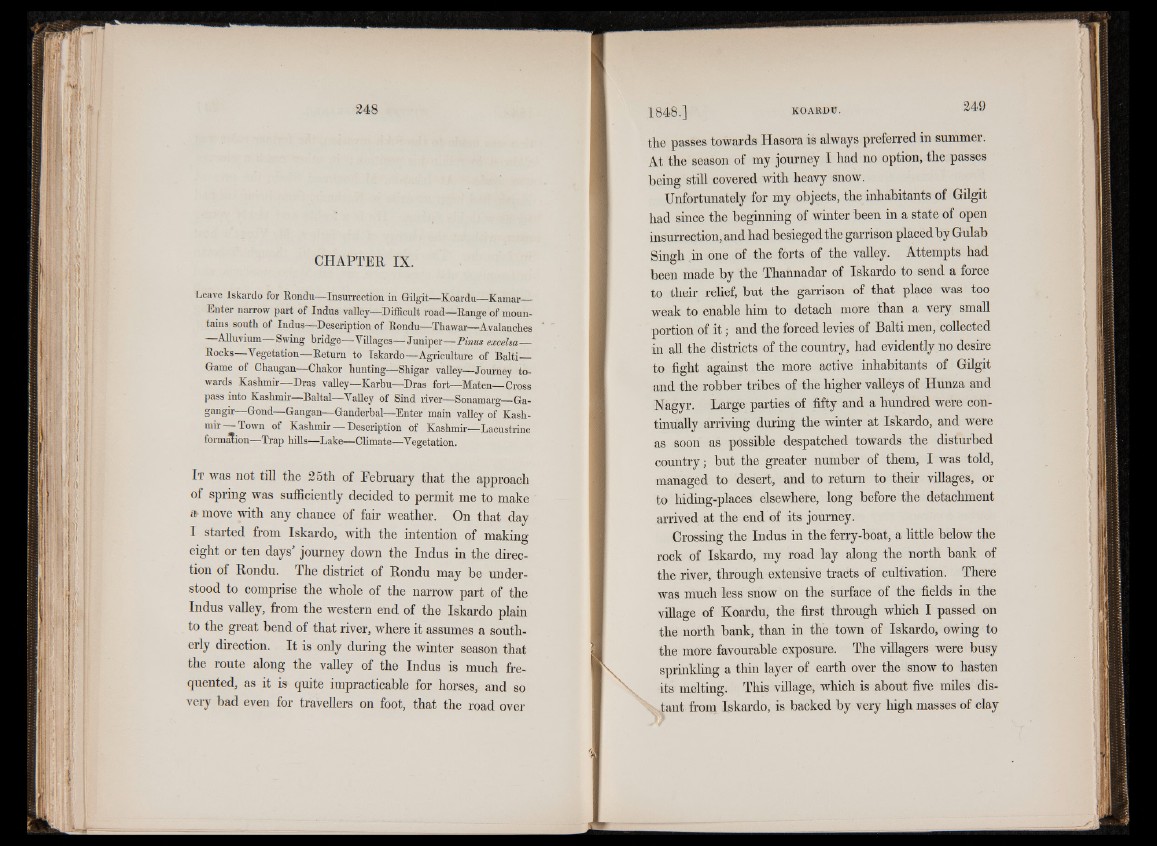
CHAPTER IX.
Leave Iskardo for Eondu—Insurrection in Gilgit—Koardu—Kamar__
Enter narrow part of Indus valley—Difficult road—Eange of mountains
south of Indus—Description of Eondu—Thawax—Avalanches
Alluvium— Swing bridge— Villages— Juniper—Finns excelsa—
Eocks—Vegetation—Eeturn to Iskardo—Agriculture of Balti—-
Game of Chaugan—Chakor hunting—Shigar valley— Journey towards
Kashmir—Dras valley—Karbu—Dras fort—Maten— Cross
pass into Kashmir—Baltal—Valley of Sind river—Sonamarg—Ga-
gangir—Gond—Gangan—Ganderbal—Enter main valley of Kashmir—
Town of Kashmir — Description of Kashmir—Lacustrine
formation—Trap hills—Lake—Climate—Vegetation.
It was not till the 25th of February that the approach
of spring was sufficiently decided to permit me to make
* move with any chance of fair weather. On that day
I started from Iskardo, with the intention of making
eight or ten days’ journey down the Indus in the direction
of Rondu. The district of Rondu may be understood
to comprise the whole of the narrow part of the
Indus valley, from the western end of the Iskardo plain
to the great bend of that river, where it assumes a southerly
direction. It is only during the winter season that
the route along the valley of the Indus is much frequented,
as it is quite impracticable for horses, and so
very bad even for travellers on foot, that the road over
the passes towards Hasora is always preferred in summer.
At the season of my journey I had no option, the passes
being still covered with heavy snow.
Unfortunately for my objects, the inhabitants of Gilgit
had since the beginning of winter been in a state of open
insurrection, and had besieged the garrison placed by Gulab
Singh in one of the forts of the valley. Attempts had
been made by the Thannadar of Iskardo to send a force
to their relief, but the garrison of that place was too
weak to enable him to detach more than a very small
portion of i t ; and the forced levies of Balti men, collected
in all the districts of the country, had evidently no desire
to fight against the more active inhabitants of Gilgit
and the robber tribes of the higher valleys of Hunza and
Nagyr. Large parties of fifty and a hundred were continually
arriving during the winter at Iskardo, and were
as soon as possible despatched towards the disturbed
country; but the greater number of them, I was told,
managed to desert, and to return to their villages, or
to hiding-places elsewhere, long before the detachment
arrived at the end of its journey.
Crossing the Indus in the ferry-boat, a little below the
rock of Iskardo, my road lay along the north bank of
the river, through extensive tracts of cultivation. There
was much less snow on the surface of the fields in the
village of Koardu, the first through which I passed on
the north bank, than in the town of Iskardo, owing to
the more favourable exposure. The villagers were busy
sprinkling a thin layer of earth over the snow to hasten
its melting. This village, which is about five miles distant
from Iskardo, is backed by very high masses of clay